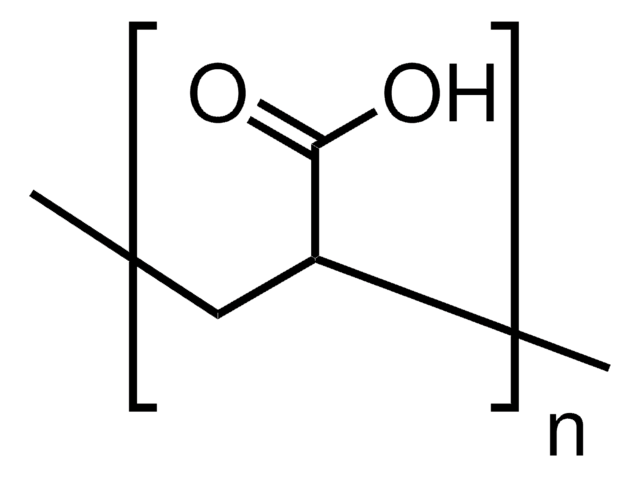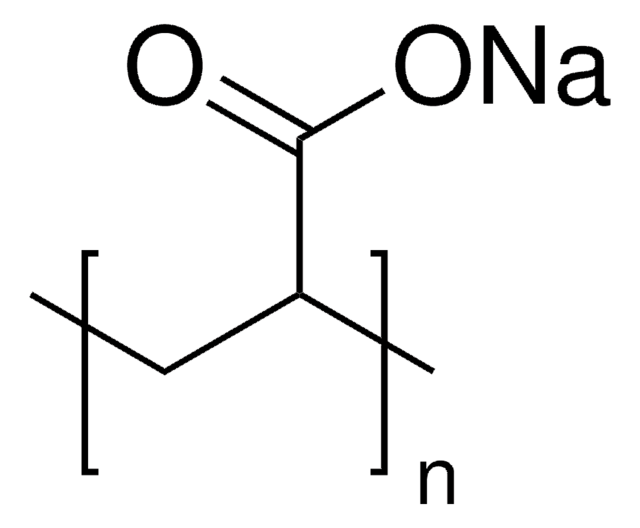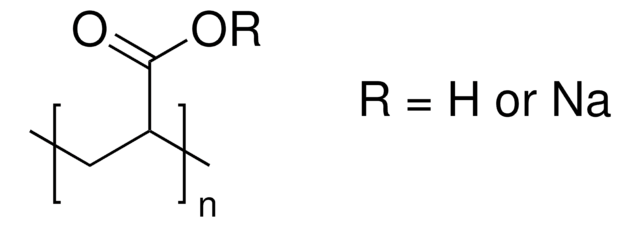Wichtige Dokumente
323667
Poly(acrylsäure)
Synonym(e):
PAA
About This Item
Empfohlene Produkte
Mol-Gew.
72.06 g/mol
Qualitätsniveau
Viskosität
≤2000 cP
Übergangstemp.
Tg 106 °C
Lagertemp.
2-8°C
InChI
1S/C3H4O2.Na/c1-2-3(4)5;/h2H,1H2,(H,4,5);/q;+1/p-1
InChIKey
NNMHYFLPFNGQFZ-UHFFFAOYSA-M
Suchen Sie nach ähnlichen Produkten? Aufrufen Leitfaden zum Produktvergleich
Allgemeine Beschreibung
Anwendung
- Untersuchung der Diffusion von gelösten Substanzen in einem Polyvinylalkohol-PAA-Copolymerhydrogel
- Synthese eines Poly(N-isopropylacrylamid)-Block-PAA-Copolymers, das sowohl auf Temperatur- als auch auf pH-Wert-Änderungen reagiert
- Herstellung eines Block-Copolymers aus Oligo(methylmethacrylat) und PAA für den Transport hydrophober Medikamente in Mizellen
- Als Verdickungsmittel für Klebstoffe.
Lagerklassenschlüssel
11 - Combustible Solids
WGK
WGK 1
Flammpunkt (°F)
Not applicable
Flammpunkt (°C)
Not applicable
Persönliche Schutzausrüstung
Eyeshields, Gloves, type N95 (US)
Hier finden Sie alle aktuellen Versionen:
Analysenzertifikate (COA)
Die passende Version wird nicht angezeigt?
Wenn Sie eine bestimmte Version benötigen, können Sie anhand der Lot- oder Chargennummer nach einem spezifischen Zertifikat suchen.
Besitzen Sie dieses Produkt bereits?
In der Dokumentenbibliothek finden Sie die Dokumentation zu den Produkten, die Sie kürzlich erworben haben.
Kunden haben sich ebenfalls angesehen
Artikel
New methods for materials fabrication at the micro- and nanoscale will drive scientific and technological advances in areas of materials science, chemistry, physics, and biology. The broad diversity of potentially relevant materials, length scales, and architectures underscores the need for flexible patterning approaches. One important example is the fabrication of 3D periodic structures composed of colloidal, polymeric, or semiconductor5 materials.
Unser Team von Wissenschaftlern verfügt über Erfahrung in allen Forschungsbereichen einschließlich Life Science, Materialwissenschaften, chemischer Synthese, Chromatographie, Analytik und vielen mehr..
Setzen Sie sich mit dem technischen Dienst in Verbindung.



